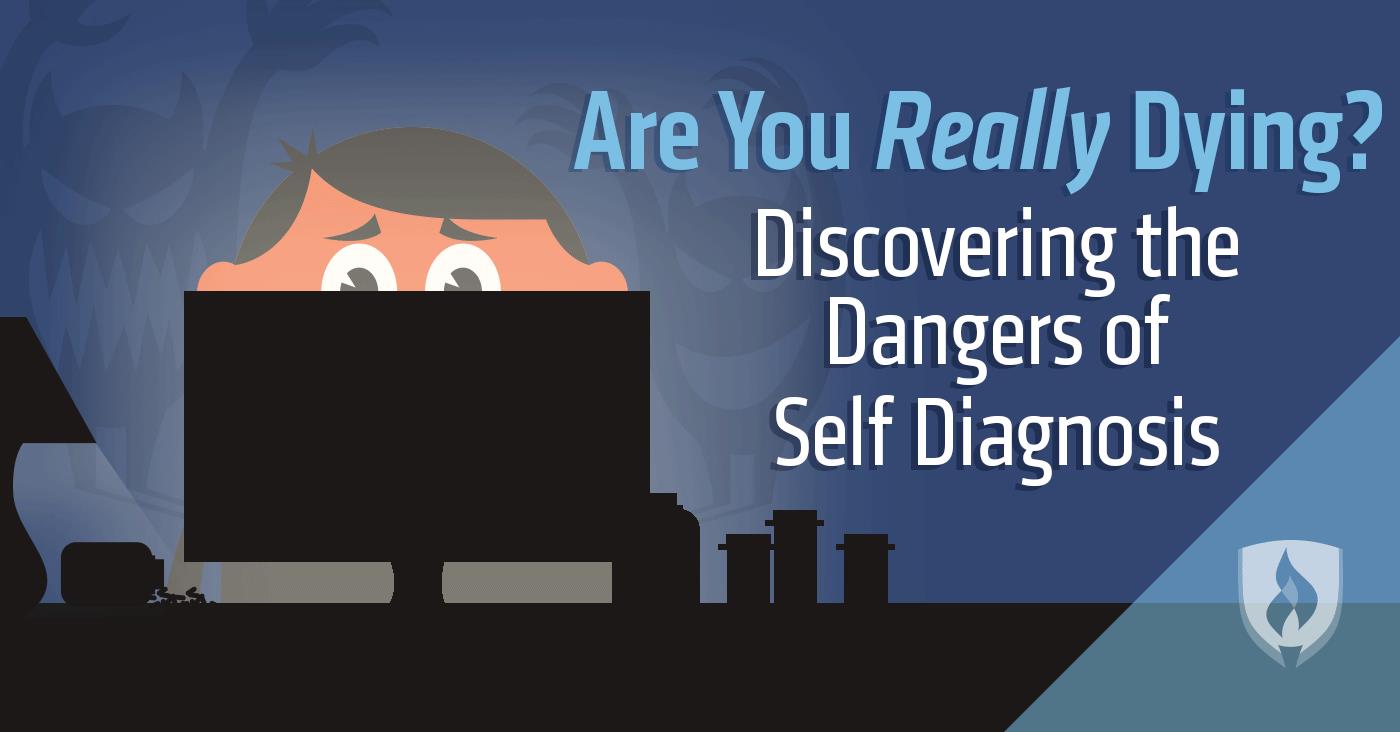
The first appointment this month was for high fever, the second for suspiciously red eyes and now your toddler has a rash spreading across their face and neck. With limited time off at your job and a high-premium health insurance plan, there’s no way you are taking her to the clinic again this month. You decide Dr. Google will suffice as you enter symptoms into your search box.
It turns out you’re not alone in turning to the internet for medical advice. The Atlantic reports that in one year, 97.5 million Americans used health websites for information. WebMD was the most popular, with 25.2 million visitors, followed by Everyday Health Network (23.4 million) and Livestrong (11.8 million).
So what’s wrong with taking initiative through personal research? While online self-diagnosis resources seem like saviors in our moments of confused illness, healthcare professionals see dangers in this practice. Our research and conversations with health experts might make you think twice before relying on Dr. Google. Read on to learn about the dangers of self-diagnosis.
Get Your Nursing School Questions Answered at a Nursing Information Session
What are the risks of self-diagnosis?
While healthcare professionals acknowledge the convenience of the internet and sympathize with the struggle of some insurance plans, here are a few dangers of depending on the World Wide Web for your health education.
Unwarranted panic
For some, it’s a simple math equation: Symptoms + internet search = you’re probably dying.
“People read about the worst possible scenario on Google when they look up their symptom. This can contribute to hysteria,” says Dana Corriel, a board-certified Primary Care Physician at Highland Medical in Pearl River, New York. “It’s human instinct to worry about worst possible outcomes. We prepare for the worst to ensure survival.”
The stress caused by assuming the worst about your symptoms before seeing a doctor can end up becoming an added detriment to your health.
Unreliable sources
“You don’t need credentials to add your two cents on the web,” Corriel says. “Anyone can write anything about any topic, especially with social media.”
Corriel has seen bad advice in response to moms asking health-related questions about their children’s ailments on Facebook. She warns of health blogs written by people unqualified to be giving advice.
“Often times, the information is too general,” Corriel explains. “Each person has a different family history, different risk factors and a varying social history, all of which contribute to the decision-making process a physician goes through when deciding on a proper diagnosis.”
The benefit of seeing a doctor is the access to trained medical experience and the personal relationship you form. The personal knowledge your doctor has about you and your medical history can’t be replaced by a website.
Unfounded nonchalance
While some of us automatically assume the worst about our symptoms, some of us will do anything to write off our symptoms as “normal” and avoid going to the doctor. Just as you can find websites telling you your chronic headache and cough are sure signs of a rare, deadly disease, you can also find articles assuring you they are merely symptoms of the common cold. Just “wait it out” for a few more months. It’s hard to avoid personal bias about your health when you seek to self-diagnose using Google.
Unnecessary treatments and testing
“While an inaccurate diagnosis can be stressful, the greater risk is that patients take the next step in attempting to treat,” says Nicole Prause, Licensed Psychologist and Neuroscience Researcher at Liberos. “This can lead to unjustified expense at the least and dangerous effects at worst.”
Corriel also sees the financial burden of unnecessary testing with the amount of 20- and 30-year-olds now requesting MRIs because they have headaches. The undue stress takes a toll on your emotional wellbeing, and it’s expensive for the patient, the insurance company and the medical provider.
There’s also the danger of self-medicating using products with unforeseen, negative side effects. It’s best to consult your doctor about remedies you’d like to use because your provider will be able to inform you of the risks associated with these treatments, specific to your health and history.
Inability to accept professional diagnosis
We assume the most harm is done when someone outside the medical field uses the internet to self-diagnose. However, Mert Erogul, an experienced doctor at Kings County Hospital in New York, writes of his own struggle with self-diagnosis in his book, The Perils of Being Your Own Doctor. At age 44, Erogul noticed worrisome symptoms in his physical abilities including a hitch in his left leg, numbness and aching in his left arm and hand and dropping a microphone mid-lecture. Erogul’s medical knowledge assured him he had ALS.
After seeing multiple neurologists and undergoing various testing, each one concluded he did not have ALS. However, Erogul could not get past his symptoms. His unwavering fear of having ALS caused him to go through countless hours of stress, losing sleep and struggling to be present and positive in his family interactions. Only after Erogul finally accepted the experts’ diagnosis of his symptoms was he able to return to his responsibilities without the fear of ALS haunting his daily activities.
It doesn’t take a medical background to become locked in on a self-diagnosis; we can psychologically become hung up on what we believe to be true even in the face of expert opinion. This may not always come to these extremes, but even some disbelief can cause unnecessary visits to seek second opinions.
What are the alternative options to self-diagnosis?
Even after understanding the perils of self-diagnosis, you can’t get past the convenience of using the internet from the comfort of your couch. The last thing you have time for is sitting in a waiting area to be seen at the clinic.
Thanks to technology and continuous efforts to get patients the best care, there are preliminary steps you can take before getting in your car to see a doctor:
- Patient portals: Some hospitals and clinics now offer patient portals that allow you to communicate with healthcare professionals prior to scheduling an appointment. For example, patients at Mayo Clinic can create an online account to send messages, similar to emails, to doctors and nurses regarding symptoms or health-related questions. A provider follows up with a message or phone call about next steps.
- Nurse hotlines: Many clinics have 24-hour nurse hotlines you can call to discuss symptoms. A nurse goes through a series of questions to advise you on whether or not you need to come in to be seen.
Think twice about self-diagnosing
While this article may sound like an internet ban when it comes to your health, it’s important to know that doctors do not intend to prohibit their patients from playing an active role in healthcare.
“If you’re a critical consumer, able to identify reasonable sources of information with skepticism, then self-education can be an important part of managing healthcare,” Prause acknowledges.
Prause says it may still be helpful in suggesting what symptoms you should mention to your provider during a visit. The key is to be cautious of the risks involved with self-diagnosis and to keep a critical eye on where you’re finding your information.
Diagnosing a patient takes the knowledge and skill of a medical professional. Your interest in understanding symptoms and what’s ailing you or your loved ones might be a sign you should consider a career in healthcare. If you’ve ever thought about working as a nurse, you’ll want to read our article, “Would I Be a Good Nurse? 10 Questions to Consider.”
RELATED ARTICLES:




